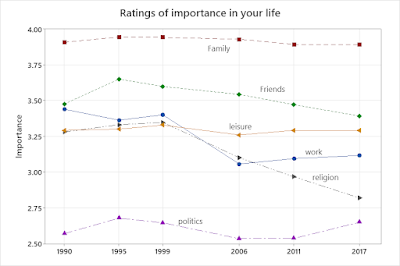I'm returning to the question of whether American values have changed: specifically, whether there's been a move towards money and careers and away from personal relationships. Following a suggestion from Claude Fischer, I looked at the World Values Survey. Starting in 1990, it has a series of questions asking how important various things are in your life: very important, rather important, not very important, or not at all important. People are asked about family, friends, leisure time, politics, work and religion. The average ratings in the United States:
Religion and work have clearly declined, while the others don't show any clear trend. In 1990, family ranked first, then friends and work almost tied, then leisure and religion almost tied, then politics far behind. Now it's family, friends, leisure, work, religion, politics. Whatever you think about the decline in ratings of religion and work, people aren't turning away from personal relationships.
Part of the reason I am interested in this issue is that many people say that the problems in American politics today reflect problems in society. There are many variants of this analysis, but the idea that people have become more focused on themselves is a popular one. Nicholas Kristof offered another one the other day--that they result from stagnation or decline in working-class standards of living--so while I'm at it I'll look at his evidence. Kristof says: "Average weekly nonsupervisory wages, a metric for blue-collar earnings, were actually higher in 1969 (adjusted for inflation) than they were this year." He doesn't link to his source, just says it's from the Bureau of Labor Statistics, but I tried to reconstruct it from the Federal Reserve Economic Data.
He's right--in fact, average weekly nonsupervisory earnings are lower then they were in 1965. There's been an increase in part-time work since the `1960s, which is related to increased labor force participation by women, so I also show the figures for real hourly wages. They give a more optimistic picture, but still say that there's been essentially no progress since 1973. However, there are actually two offsetting periods of change: a decline from the early 1970s until the mid-1990s and a pretty steady increase since that time. So any reaction to economic distress should have occurred in the 1980s or 1990s, not in the last few years. Of course, these figures aren't definitive, but they're what Kristof uses.So what is the problem? I agree with another New York Times columnist, David French, that it's primarily one of political leadership. Of course, that raises the question of why the quality of political leadership has declined. I've had several posts that touch on that issue, but haven't addressed it directly--I'll do that in the near future.


No comments:
Post a Comment